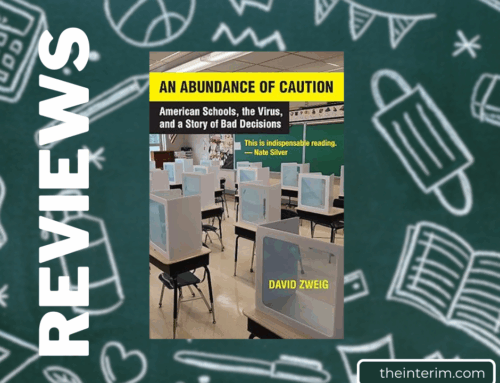Rick McGinnis:

Interim writer, Rick McGinnis, Amusements
At the risk of repeating myself, we are being promised an end to lockdowns, though depending on where you live the timetable may vary. Attempting to spin sluggish vaccination numbers, Canada’s government has promoted a “one dose summer” that differs in no substantial way from last year’s no dose summer, but the news is full of rumours that, elsewhere in the world, life is returning to something like normal.
What normal might be, however, is subjective. Some of us will never return to regular office hours or daily commuting, schools might take on a very different character and structure, and precisely how many of our favorite shops, bars, restaurants, clubs and hotels might still be in business is an open question. Which makes you wonder, after over a year’s worth of closures, restrictions and economic harrowing, just what will we be able to live without?
One thing we know is that Canada can muddle along without a Governor General. As I write this, it has been four months since Julie Payette resigned from the posting ahead of growing scandals, and no moves have been made by Justin Trudeau’s government to replace her.
So what else could we do without, as a country?
University of Toronto Press published The End of the CBC? – a book by David Taras and Christopher Waddell, two professors of journalism and media studies – in the middle of last year’s lockdowns. It joins a list of books, magazine articles, policy papers and studies that have puzzled and debated about the national broadcaster’s viability in a cultural and media landscape that has been changing since the early ‘60s, when the first private broadcast networks started challenging its business model and its reason to exist.
These books have sell-by dates, as changes in technology and society bury the old crisis and introduce the newest one. The events of the past year might in fact have changed the game’s rules enough to make The End of the CBC? mostly a snapshot of the country and its broadcaster at the end of the second decade of the 21st century and not the start of the third.
Defenders of the CBC are a small but vocal group, judging by the broadcaster’s persistence despite decades of decreasing viewership. The corporation’s survival is partially an example of entropy – a not inconsiderable factor in Canadian politics, as well as any entity that persists as a line item in government budgets – as is the refrain that the CBC needs to exist in order to fulfill its mission of telling uniquely Canadian stories and, above all, being a pillar in the foundation of national unity.
It might not be accidental that, in a recap of the history of the CBC, Taras and Waddell note that the broadcaster – specifically Radio-Canada, its Quebec-based, French language entity – played a considerable role in enabling the crisis known as either Quebec separatism or sovereignty (depending on when you’re talking about it), by giving prominent voice to critics of the old, Catholic province of Maurice Duplessis and his Union Nationale party, midwifing the birth of the Quiet Revolution. Rene Levesque, the father of separatism as a political force, actually launched his career as the host of Point de Mire, a popular TV news program on Radio-Canada.
It’s an article of faith on Canada’s political right that the national broadcaster is in the political pocket of the party that flatters itself as being “Canada’s national governing party.” Taras and Waddell torpedo that myth with a graph that details funding for the CBC over nearly forty years.
The steepest dip in funding occurred over twenty years ago –when federal appropriations for the broadcaster dropped from nearly $1.2 billion in 1996 to $800 million in 1998, the lowest since 1983. This straddles the transition between the first and second terms of Jean Chretien’s Liberal government; the CBC wouldn’t restore its funding to the same level until 2010, during the reign of Conservative Prime Minister Stephen Harper.
This too is Radio-Canada’s fault; the Quebec arm of the corporation has a historically hostile relationship with the Liberal party, and since the party draws its leadership largely from within the province, Liberal party leaders like Chretien took the sleights personally.
More recently, the promising career of Melanie Joly, Justin Trudeau’s first Minister of Canadian Heritage, was probably cut short when Creative Canada, her much-heralded plan for the transformation of the country’s creative industries, met with a hostile response for its vague but still prescient scheme to partner with Netflix on TV production.
Her plan, however, was met with a lack of enthusiasm in English Canada and with outrage in Quebec for its lowball funding figure for French-language productions; she endured a hostile reception by media in the province that can make or break the career of a Liberal politician. In 2018 Joly was shuffled to Tourism, Official Languages and La Francophonie, and then to Economic Development and Official Languages. It remains to be seen if she’ll recover.
The simple fact is that the CBC is to Conservative governments what native issues are to Liberal ones – a political talking point during elections, used to either excite the base or beat the opposition. Once in power, however, promises to defund the CBC or deliver drinkable water to reservations return to background noise.
A lot of systemic issues beset the CBC, but one of the worst – and one that’s impossible to remedy as long as the broadcaster is funded from the federal budget – is political interference. Simply put, he who pays the piper calls the tune. In 1966 the Liberal government of Lester Pearson intimidated the network into cancelling This Hour Has Seven Days, a landmark show, when it criticized his government.
“The very fact that a prime minister could orchestrate the cancelling of a highly popular TV show because it mocked his government is chilling,” write Taras and Waddell. “It is as if Donald Trump were able to order Saturday Night Live off the air because he didn’t like the way he was portrayed in its comedy sketches.”
Like any book about the future of the CBC, the authors end with a chapter suggesting how the broadcaster might survive. As with similar proposals, there are the usual exceptions and conditions – the future of Radio-Canada is considered as a separate issue, beyond the scope of the book, and television, not radio, is the primary focus. Taras and Waddell insist that the network should withdraw from areas—such as sports, music, drama, children’s programming, comedy and entertainment—in which it long ago lost a competitive edge, and is unlikely to recover under its funding model. The broadcaster should also become commercial-free, leaving private broadcasters to chase diminishing advertising dollars.
The CBC’s energies should be concentrated on news and current affairs programming. There is no small amount of idealism behind this plan: “There can be no great countries without great journalism,” they write, “the kind of journalism that exposes issues, stirs thinking and debate, and produces credible facts and information.”
Perhaps this is true. Perhaps the CBC can overcome the perceptions of bias that dog it and every other news organization today. But even if it does, will it appeal to a broad audience stretched over the disparate regions and vast geography of the country? The deciding votes are the majority of that audience, huddled close to the American border, and even more absorbed in U.S. news media and cultural production than they were, back when the CBC was formed. It’s mandate was to give an answer to the choice between “the state or the United States,” as it was presented in 1930 by the Canadian Radio League, a lobby group that argued for the creation of a national broadcaster.
Journalists – and professors of journalism and media studies – are very fond of imagining that audiences are hungry for well-researched, in-depth long-form news stories, when it might just be themselves, their friends and students who want these things. While they agitate for this return to a golden age of professional journalism, they admit that we live “in an era when the curating role that news organizations used to play…no longer exists. Social media, with its ‘interesting if true’ standards for accuracy, has replaced mainstream media for many, if not most Canadians.”
With every successive generational cohort’s attention span circumscribed by the amount of type you can fit on a cellphone screen, where will this re-imagined CBC find its perfect audience?
When confronted with a problem where no previous solution has worked, it’s likely that you’re looking at it from the wrong end. Books like The End of the CBC? fixate on the viability of the last two letters – “Broadcasting Corporation” – of the acronym. Perhaps we should be concerned about the first letter: the “Canadian.”
Before the formation of the CBC as a radio network in 1936, the country wasn’t without public broadcasters. The University of Alberta had set up its own station, and the government of Manitoba owned two stations. Even today, the province of Ontario funds TVO (and a Francophone twin, TFO), its own educational television network, Quebec has Tele-Quebec, and British Columbia has the Knowledge Network. One way of looking at it is that there’s some duplication at work; another way is that the question of public broadcasting was already solving itself before the CBC was created.
Taras and Waddell make it clear that the existence of Radio-Canada is responsible for a good deal of the politicization of the CBC, but they exempt it from much of the criticism they level at its Anglo counterpart. It’s Quebec, goes the old refrain: they do things differently there. Imagining that the province should be tasked with funding of what amounts to its own, unique broadcast entity violates the doctrine of federalism, and in any devolved scenario it would ultimately get its funding from transfer payments.
As it was conceived, the CBC was always going to be fighting a rear-guard action against the influence of American broadcast culture. It could be fought to a draw where the reach of their signals didn’t extend much past the borders, but with the rise of cable and streaming there is no way to win that battle, as Taras and Waddell admit by prescribing the amputation of the CBC’s uncompetitive limbs, and co-operation with Netflix, Facebook, Google and others.
Perhaps it’s time to admit that trying to tie together a nation of regions that are looking south (and occasionally east, sometimes west, but never north because there’s almost no one there) more than ever before is pointless. In any case only one region of the country has sufficient confidence in its identity to offer compelling resistance, and it distorts our political machinery with its exceptional status so much that what we call democracy is constantly undermined.
The glib joke used to be that Canadian identity boiled down to “not American.” But the national institution created to help define that identity has failed so signally in its mission that, near the end of nearly nine decades, we still imagine that it can succeed – if only it had enough money, or a role everyone understood.
Justin Trudeau is fond of referring to the country he governs as the world’s first “postnational state.” Like so much of the ad copy and inspirational messaging he uses to describe his policies, I’m not sure he really knows what he means. In this case, though, he might be on to something.
But the unprecedented cultural and social void implied by his words might actually be the epitaph on the headstone of our national broadcaster, since they imply that trying to unify such an amorphous entity is impossible, even if you let someone else pay for Schitt’s Creek and set the country’s journalism school graduates to making a story in Kamloops register on someone’s cellphone screen in Bridgewater.
Perhaps I’m wrong. I’d like to hope I am. But I have a sneaking suspicion that I won’t be proved wrong by the CBC.




